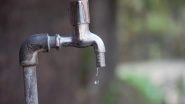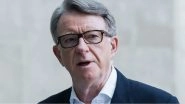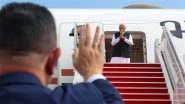Beirut, Jan 28 (AP) Lebanese security forces fired tear gas and water cannons in clashes Wednesday with dozens of protesters who took to the street in the country's north for a third consecutive day to denounce deteriorating living conditions amid a strict lockdown to prevent the spread of the coronavirus.
Meanwhile, Lebanon hit a new daily record for COVID-19 fatalities, registering 76 deaths. Daily infections have soared in recent weeks and hospitals have struggled with COVID-19 patients, reporting near full occupancy in ICU beds.
Nearly 290,000 infections have been recorded since last February and 2,553 deaths.
To respond to the crisis, the government has imposed a nearly month-long nationwide lockdown and round-the-clock curfew, the strictest since the virus hit Lebanon.
The measures have exacerbated a crippling economic and financial crisis that preceded the pandemic in this small Mediterranean country of nearly 5 million people and over 1 million refugees.
The Lebanese currency has tumbled, losing over 80% of its value. Banks have imposed controls on withdrawals and transfers to protect dwindling foreign reserves. Unemployment and inflation have skyrocketed.
On Wednesday, dozens of protesters took to the streets for the third straight day in Tripoli, Lebanon's second largest city and the most impoverished, demanding an end to the lockdown. Some tried to torch vehicles and were beaten back by security forces firing tear gas and water cannons. At least 20 were injured by tear gas and were treated on the spot.
The protests are also a reflection of frustration at politicians who have been deadlocked over the formation of a new government for nearly six months. The government resigned in August following a massive blast at Beirut's port, which killed over 200 people and injured thousands.
Lebanon's ruling class has faced rising popular anger since protesters took to the streets in October 2019, in the largest-ever nationwide protests in the country. Demonstrators accused them of mismanaging and robbing the country of its resources and driving it into poverty.
The protests later died down, in part because of the pandemic but also because the political class held on to power and divisions emerged among the demonstrators.
On Wednesday, Lebanese officials unveiled the national vaccination plan, saying the government aims to inoculate around 80% of the population by the end of the year. The first batch of Pfizer-BioNTech vaccines is scheduled to arrive in Lebanon by mid-February. (AP)
(The above story is verified and authored by Press Trust of India (PTI) staff. PTI, India’s premier news agency, employs more than 400 journalists and 500 stringers to cover almost every district and small town in India.. The views appearing in the above post do not reflect the opinions of LatestLY)













 Quickly
Quickly


